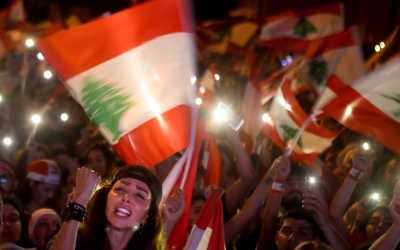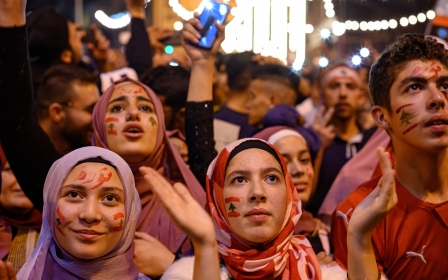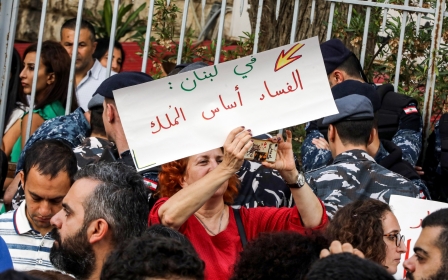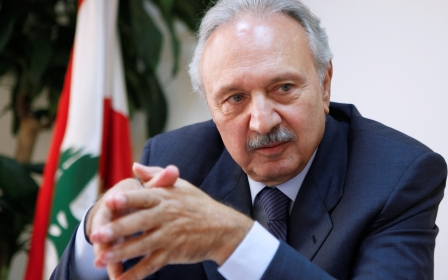One month on, Lebanese protesters cling to their demands
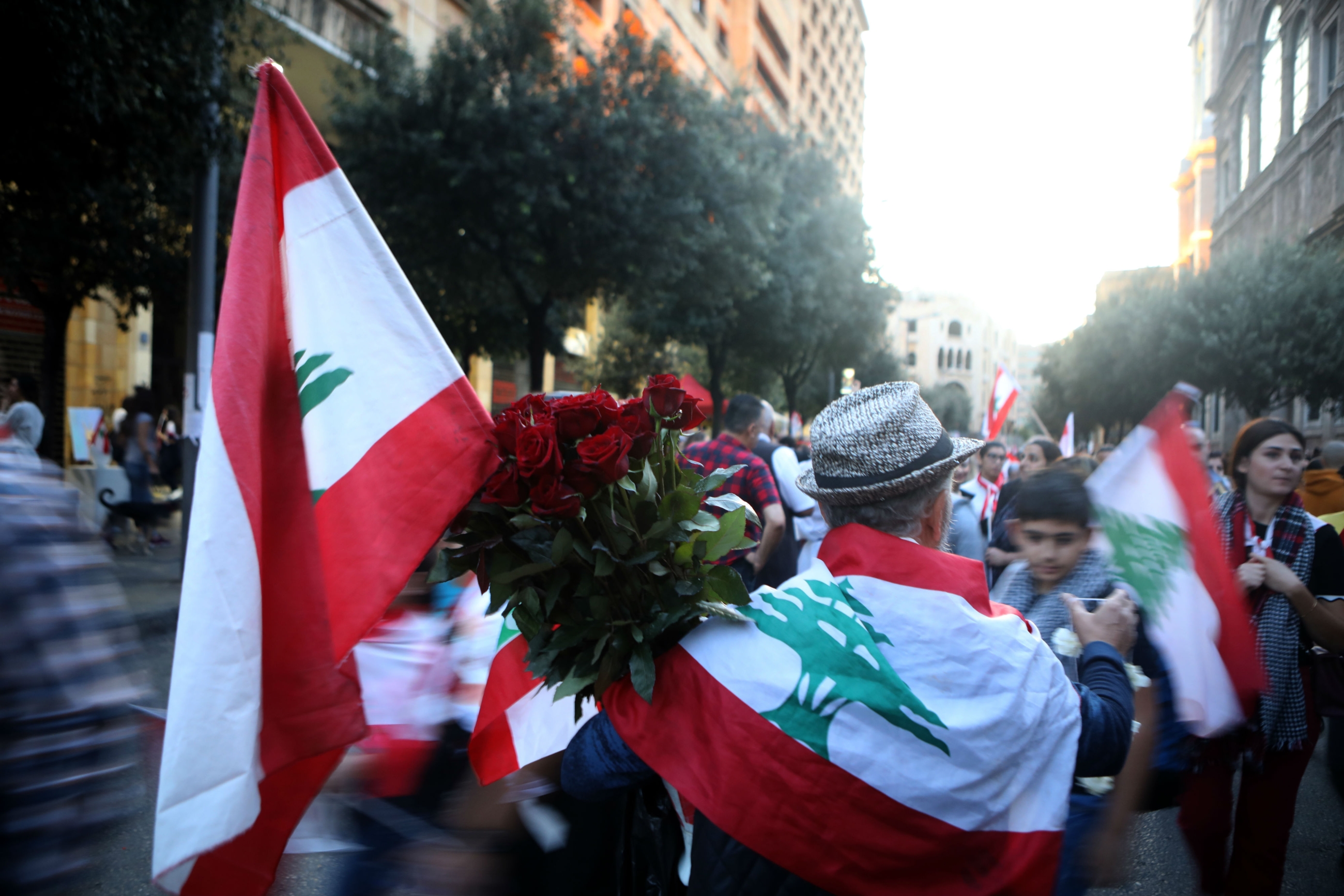
Lebanon’s anti-government protest movement hit the one-month mark on Sunday, amid a deepening political deadlock preventing urgent economic reforms.
In downtown Beirut, one of the epicentres of the popular mobilisation, protesters celebrated a number of small achievements but reaffirmed their resolve to have their core demands met.
“We want a technocratic government and the chance to live in a country where the law is equal for all,” Talal Jurdi, a 51-year-old actor, told Middle East Eye.
On 17 October, Lebanese took to the streets against corruption, a sectarian-based power-sharing system governing the country, economic hardship, and the political class demonstrators hold responsible for their plight.
“Sectarianism rules this country. If you win a public bid it should be because you are smart, not because you belong to this or that sect.”
Calls for a technocratic government composed entirely of independent experts have so far fallen on deaf ears. Since Saad Hariri resigned as prime minister on 29 October, the country has been unable to appoint a new prime minister and government.
Attempts to form a new government needed to enact reforms hit a snag at the weekend when former finance minister and billionaire businessman Mohammed Safadi withdrew his candidacy, plunging the country deeper into political uncertainty.
Al-Joumhuria newspaper on Monday quoted Nabih Berri, the speaker of parliament, as saying that Lebanon was like a sinking ship that will go under unless action is taken to deal with the country's economic and political crisis.
An-Nahar, another newspaper, quoted Berri as likening the situation of the Lebanese people to that of passengers on the Titanic.
Berri said he still hoped Hariri would agree to form the new cabinet, al-Joumhuria reported.
Small victories
Safadi’s withdrawal comes following renewed pressure by protesters calling for an overhaul of the country's political system.
Safadi, a former member of parliament from the city of Tripoli, amassed his fortune largely through real estate and is seen by demonstrators as an emissary of the old sectarian system.
“That’s a joke,” Hala Khodary, a protester in downtown Beirut, said about Safadi’s nomination.
'If we have an independent judiciary we can open the corruption files and put corrupt politicians on trial'
-Manal Goumaa, lawyer
The 40-year-old chocolatier told MEE she believed the protest movement would not back down until a technocratic government comprised of independent experts was elected.
The one month mark is a sign “that revolution is no joke,” Khodary said. “We want change.”
The nomination on Sunday of an independent candidate to the helm of the Beirut Bar Association gave protesters gathered in Downtown a reason to celebrate.
At one of the many tents set up in Martyrs’ Square to accommodate ongoing public debates, a group of lawyers broke into an impromptu celebratory dance.
The nomination of Melhem Khalaf was hailed as a reason to stay hopeful.
“This is a step towards an independent judiciary,” lawyer Manal Goumaa told MEE. “If we have an independent judiciary we can open the corruption files and put corrupt politicians on trial.”
As the political tug-of-war continues, Lebanon’s economy is plunging deeper into turmoil.
Dollar withdrawal cap
After a two-week closure, banks briefly reopened on 1 November, only to close again last week after a staff strike over safety fears as people demanded access to their money.
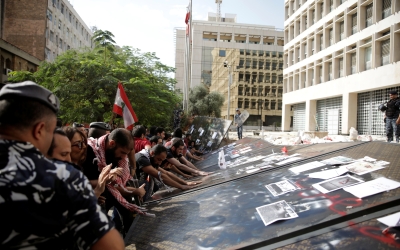
Lebanon’s central bank rejected calls for the institution of formal capital controls, leaving financial institutions to enforce haphazard measures to limit the flight of capital. Banks have blocked most dollar withdrawals and transfers abroad to avoid capital flight.
Meanwhile, Lebanon's banking association on Sunday set out temporary directives for commercial banks that include a $1,000 cap on weekly withdrawals from US dollar accounts.
Businesses that buy in US dollars and sell in Lebanese pounds have been the most impacted by the dwindling foreign currency reserves. A number of gas stations only accept dollar payments and some shut down due to their inability to pay for fuel imports in dollars.
Tensions escalated further on Tuesday as protester Alaa Abou Fakhr was shot in Khaldeh by an army officer as he attempted to block a road, in an incident that was the first of its kind in nearly four weeks of nationwide protests.
The killing occurred as President Michel Aoun’s speech sparked a new round of protests and roadblocks on Tuesday evening.
Aoun angered protesters by saying that current politicians must be included in the new government and that if protesters “see no decent people in this state, let them emigrate”.
He also warned that the country would face catastrophe if protesters did not go home. “If you continue in this way, you will strike Lebanon and your interests,” he said.
However, the nation-wide movement seems unlikely to back down as protesters cling to their core demands, some of which include a government of experts, prosecution of corrupt political figures, a new electoral law, and holding early elections.
Middle East Eye delivers independent and unrivalled coverage and analysis of the Middle East, North Africa and beyond. To learn more about republishing this content and the associated fees, please fill out this form. More about MEE can be found here.


